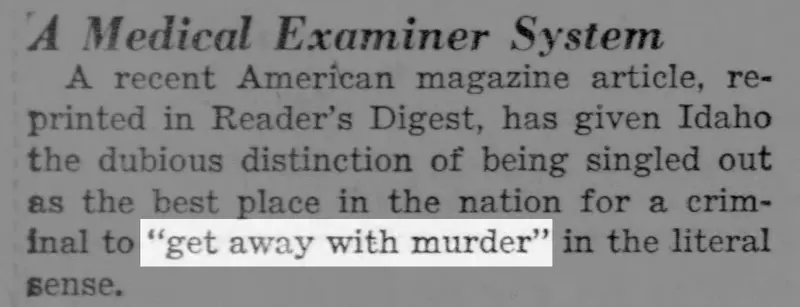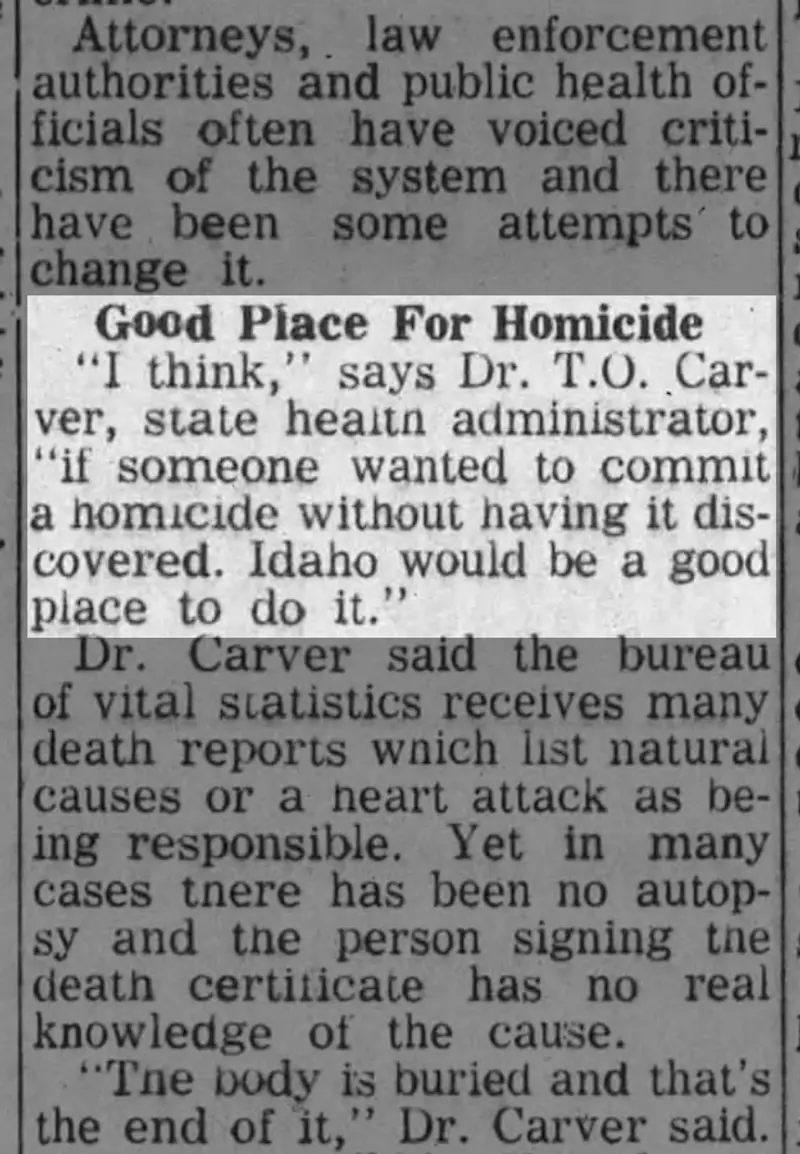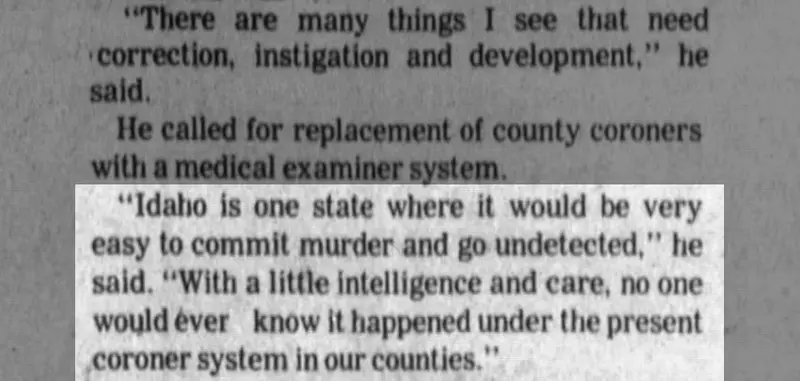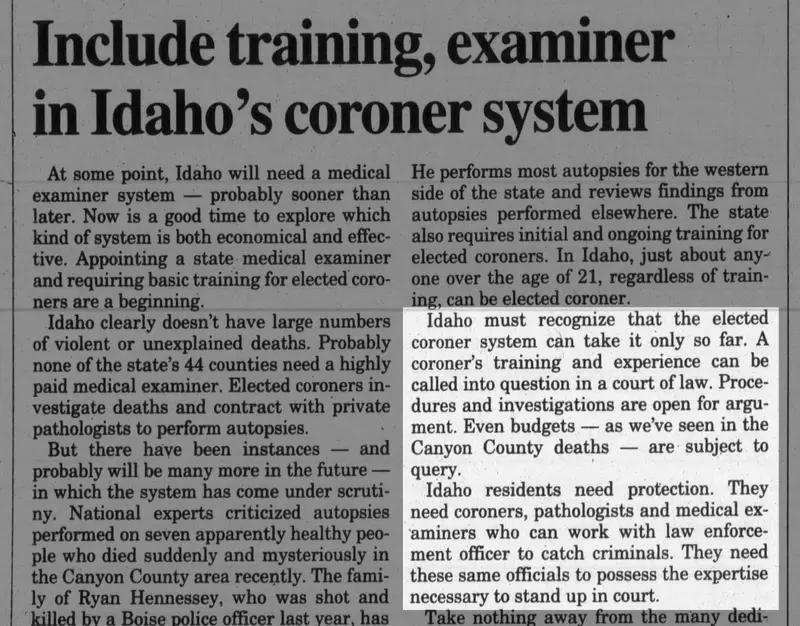A string of suspicious deaths. Two cases of infanticide that were nearly labeled as sudden infant death syndrome. A curiously low rate of opioid overdose deaths. These are among the red flags Idahoans have pointed to over the decades as they tried to get those in power to change Idaho’s system for death investigation, which relies on elected county coroners with virtually no state support or oversight.
Lawmakers have come close a few times to instituting reforms. But every attempt has failed. Often, the reason is simple, current and former coroners and national experts told ProPublica in recent months: Nobody wants to spend money on death.
But that leaves Idaho with a system where one coroner can choose not to follow national standards while a neighboring county’s coroner does.
Calls for reform to Idaho’s system have popped up nearly every decade since at least the 1950s. Some of the earliest pleas for change came from local physicians and state health officials, alarmed by Idaho’s refusal to modernize its approach to death investigations.
November 1951
The Idaho Statesman highlighted a national magazine article that called Idaho “the best place in the nation for a criminal to ‘get away with murder’ in the literal sense” because the state exemplified “how an antiquated county coroner’s system can contribute to frequent miscarriages of justice.”

Credit:
Idaho Statesman. Highlighted by ProPublica.
March 1959
A doctor who’d served as coroner of Idaho’s largest county resigned, citing “antiquated and totally inadequate” state law. He said legislators that year declined to introduce a bill that was “a middle of the road endeavor between the abysmal inadequacy of existing law and a central state medical examiners system.”
September 1965
Dr. T. O. Carver, state health administrator at the time, told The Associated Press, “I think … if someone wanted to commit a homicide without having it discovered, Idaho would be a good place to do it.” Carver praised Oregon’s medical examiner system and said changing Idaho to a similar setup would cost more, but it would yield evidence and truth.

Credit:
Sandpoint News-Bulletin via Bonner County Daily Bee. Highlighted by ProPublica.
October 1965
The director of Idaho’s vital records bureau raised alarm about the qualifications of coroners, the state’s autopsy rate and “questionable” death investigations. The director said coroners handled 600 to 700 deaths in Idaho each year, and 10% or less had autopsies.
Fall of 1976
A hospital pathologist in rural Idaho called for replacing the state’s “archaic” coroner system with a medical examiner’s office. “Idaho is one state where it would be very easy to commit murder and go undetected,” he said, according to news archives. “With a little intelligence and care, no one would ever know it happened under the present coroner system in our counties.”

Credit:
Times-News. Highlighted by ProPublica.
March 1997
Following a string of suspicious deaths, the Idaho Statesman again urged reform in an editorial: “Idaho must recognize that the elected coroner system can take it only so far,” the writers said. “Idaho residents need protection. They need coroners, pathologists and medical examiners who can work with law enforcement” to catch criminals.

Credit:
Idaho Statesman. Highlighted by ProPublica.
December 1998
The Post Register in eastern Idaho produced a series on child deaths that found a dearth of autopsies, including two cases of infanticide that were almost attributed to SIDS. In the five years that followed, legislators mulled coroner reform bills but didn’t pass any. A county prosecutor told the paper, “It’s not working in the late twentieth century, it’s not going to work in the twenty-first century.”
January 2006
Ten years after her son’s death was ruled a suicide without an autopsy, a Boise woman who became an advocate wrote in the Idaho Statesman, “Legislators must take a fresh look at laws governing the coroner system in Idaho.”
February 2019
A former state senator, family physician and county coroner wrote in his blog that Idaho was “quite likely” underreporting opioid overdose deaths, partly because coroners weren’t detecting and reporting them. “Ever since I was the Latah County Coroner for 15 years I have wondered about the wisdom of the county coroner system for the state of Idaho,” Dan Schmidt wrote. “To all the County Coroners, ask yourselves, are you happy with the system you have for investigating deaths? Are you doing a good job? Are there ways this could be done better?”
Data reporter Ellis Simani contributed data analysis.

